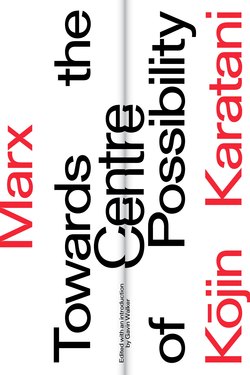Marx: Towards the Centre of Possibility

Реклама. ООО «ЛитРес», ИНН: 7719571260.
Оглавление
Kojin Karatani. Marx: Towards the Centre of Possibility
Отрывок из книги
Towards the Centre
of Possibility
.....
For Karatani, the act of reading, the politics of reading, consist in reading towards the centre of possibility expressed in the given text, and it is precisely this centre of possibility that we should affirm as the analytical core of our own reading of his project, a project devoted above all to the paradoxical explication of capital’s structures and the heretical creation of concepts for its overcoming, rather than to the canonical enforcement of academic genealogies and filiations. In contrast to Hiromatsu Wataru’s imposing Shihonron no tetsugaku (The Philosophy of Capital),1 published the same year (1974) as Karatani’s Marx began serialization, Karatani writes in a style that is deceptively simple and remarkably clear. A consistent feature of his work for decades, this speaks not only to the clarity of his thought but to his consciousness as a public intellectual.
In a sense, Karatani’s text – written as a public intervention – contains little that would help the reader situate its position genealogically, with one exception. Karatani affords a crucial place to the thought of one figure in Marxist theoretical analysis from whom he absorbed a crucial and general conceptual problem. The thinker is Uno Kōzō (1897–1977), and the problem, in the broadest possible terms, is the relationship of capital to its outside, as it were. Uno, who would go on to become one of the most dominant figures in Marxist theoretical research in Japan, and indeed one of the most famous thinkers of Marx’s value theory worldwide,2 was educated at Tokyo University.3 He left Japan to study abroad in Berlin from 1922–24, where he was accompanied by his long-time friend Sakisaka Itsurō, later the editor of the Kaizōsha edition of the Marx–Engels Collected Works – the first in the world in any language – and leader of the Japan Socialist Party following the war. (Incidentally, the so-called ‘Weimar hyperinflation’ of this period meant that with the favourable exchange rate, the Japanese Ministry of Education stipends for overseas researchers and students in Germany were worth a small fortune, and, in an interesting historical irony, it was this government money that allowed Sakisaka and other Marxist students to collect the materials that would compose the Collected Works and other original Marxian sources). Uno returned to Japan in 1924 (incidentally, on the same boat as the early Japan Communist Party leader Fukumoto Kazuo),4 where he began to teach, first at Tohoku University until 1938, when he was arrested on suspicion of his political stance. From this moment until the end of the war, Uno was forced to remain outside academic life, working in the statistics bureau of the Japanese External Trade Organization, followed by the Economic Research Institute of the Mitsubishi corporation. After the war, in 1946, he was reappointed as full professor in the department of economics at Tokyo University, and immediately released almost a decade of theoretical work that had been impossible to publish under the fascist system – Theory of Value (Kachiron, 1947), Prolegomena to the Agrarian Question (Nōgyō mondai joron, 1947), Introduction to ‘Capital’ (Shihonron nyūmon, 1948), and the first series of articles that would later form his two-volume Principles of Political Economy (Keizai genron, 1950).
.....